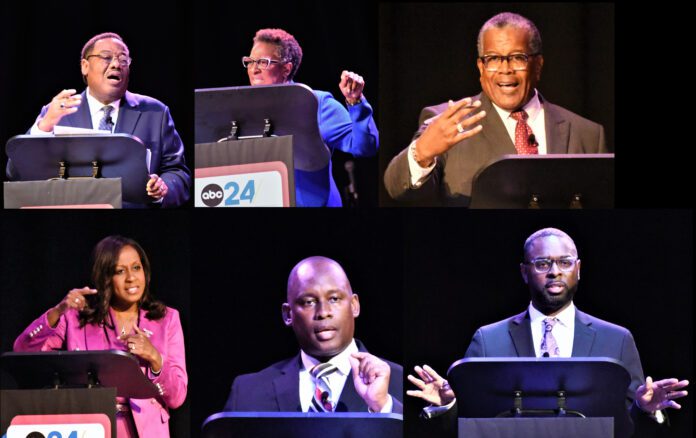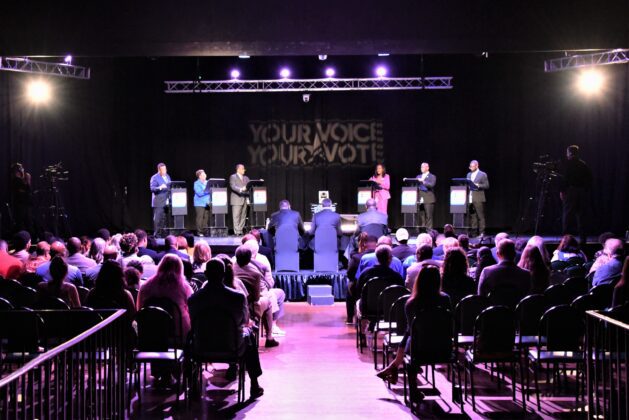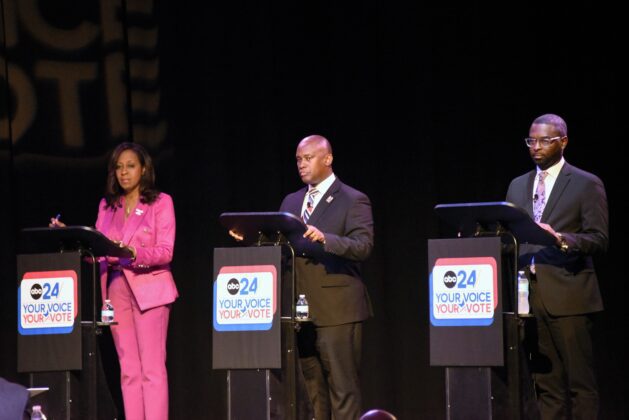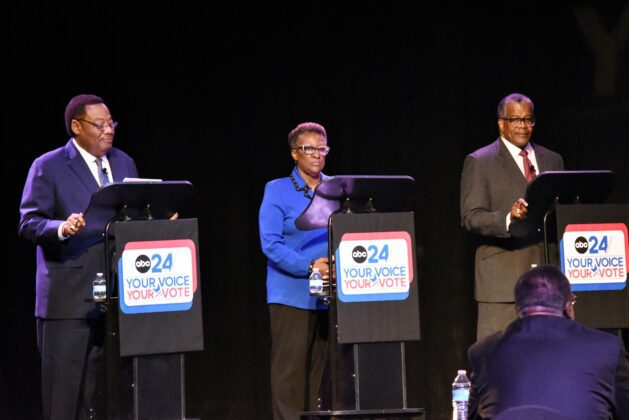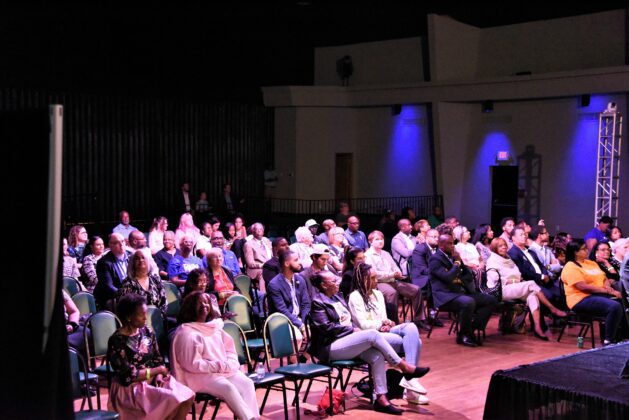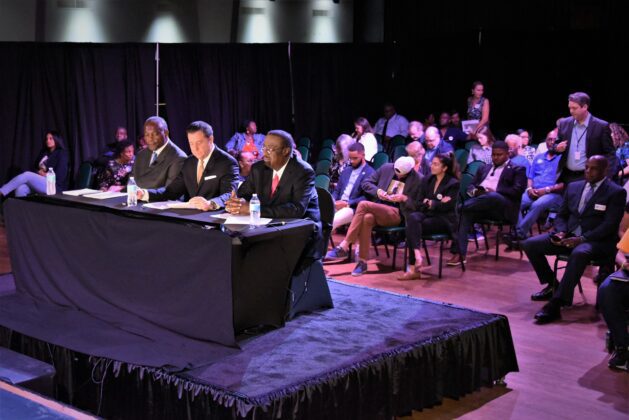Minus one of the expected frontrunners, six of the 17 candidates for Memphis mayor jockeyed for position in front of a television audience on Monday (Sept. 11) during a City of Memphis mayoral debate sponsored by ABC-TV Channel 24 and The New Tri-State Defender.
City elections are Oct. 5. Early voting begins Friday (Sept. 15).
Like the previous debate held Aug. 15 hosted by The Daily Memphian and WKNO, former mayor Dr. Willie W. Herenton elected to sit out the discussion.
He’s currently in the lead of the 17-member field, polling at 16 percent, according to an Emerson College Polling/WREG-TV News Channel 3 survey of likely Memphis voters in Memphis.
“Where are you?” wondered former Memphis-Shelby County School Board President Michelle McKissack. “How are you going to be accountable to the people, instead of resting on the laurels of something that happened 15 years ago, when you were last mayor … I know that you like to hold court at Houston’s Restaurant.”
Although the rest of the lineup lacks the political experience of the 83-year-old Herenton, who won five consecutive mayor elections, the field isn’t short on name recognition.
In addition to Herenton and McKissack, it includes Shelby County Sheriff Floyd Bonner Jr., State Rep. Karen Camper, Downtown Commission CEO Paul Young, former NAACP Memphis Chapter president Van Turner Jr., and businessman J.W. Gibson.
Among the issues brought up by a trio of hosts – The New TSD education columnist Curtis Weathers, Channel 24 commentator and political analyst and DM columnist Otis Sanford and ABC24 news anchor and managing editor Richard Ransom – was Memphis’ current struggle with crime, particularly with youth offenders.
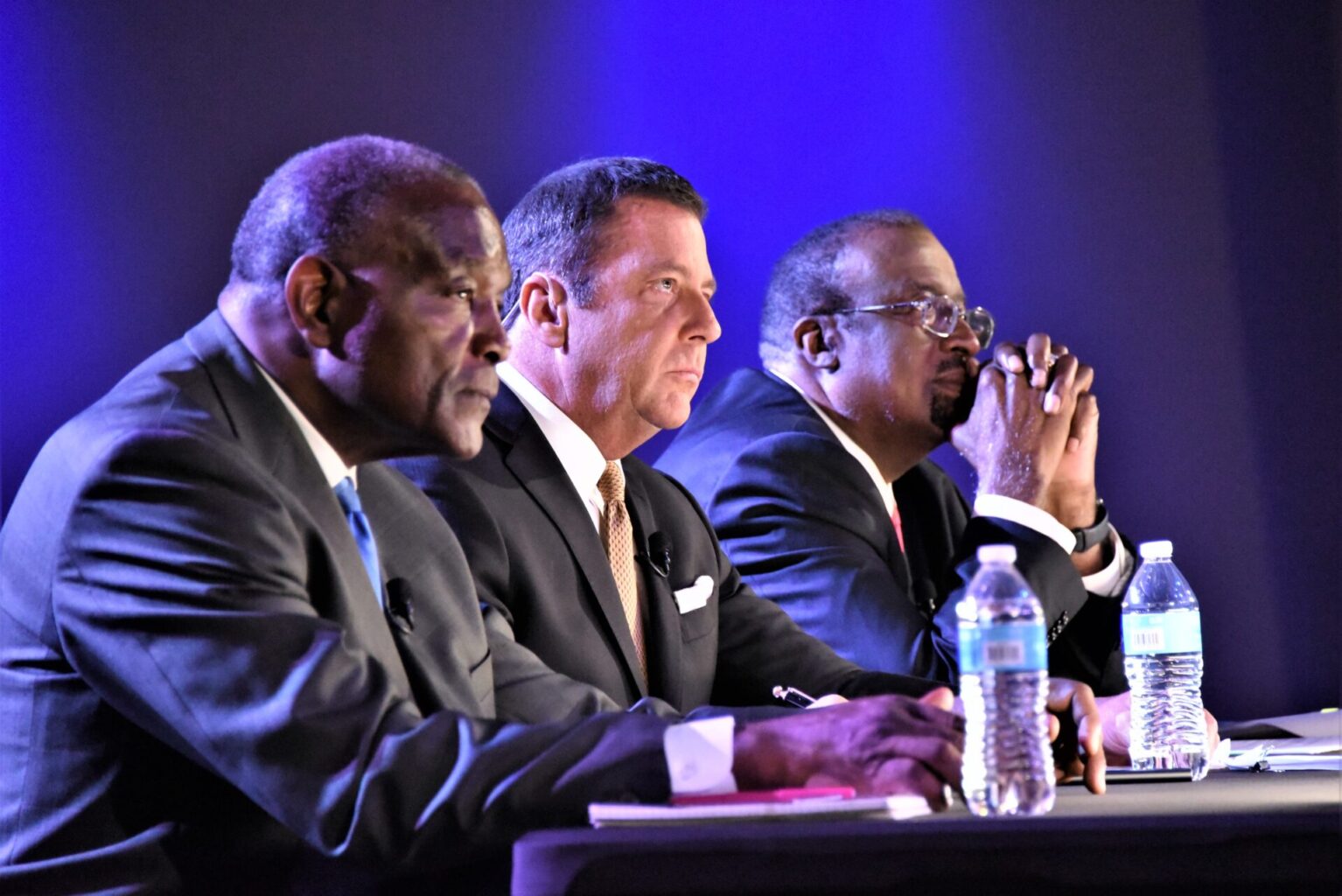
Bonner, running as a law-and-order candidate, pitched a “Desk-to-Duty” plan to put more officers on the streets.
Under the proposal, officers typically assigned to administrative work, also would pull routine street duty. He also touted his “history of working” with the Shelby County Commission to achieve goals.
“What is it you will be able to do as mayor that you have not been able to do as chief law enforcement officer of Shelby County?” asked Young.
Bonner responded by saying the duties of the sheriff only include a few corners of Memphis, while having to police the entire rest of the county.
Recently, the Memphis City Council asked the Sheriff’s Department to assign deputies to the Beale Street area after a recent mass shooting. Bonner obliged.
The second-term sheriff also drew criticism, particularly his management of the Shelby County Jail. During his tenure, 41 deaths have occurred at the lockup, including Gershun Freeman in October 2022.
The 33-year-old died during a violent altercation with jail guards. In addition to being beaten and pepper sprayed, he was kneeled on for several minutes.
Bonner has said Freeman died of a heart attack while being restrained. He also said it would be illegal for him to release video of the incident. However, he neglected to cite a particular law.
The video was eventually released by the Nashville DA’s office, who oversees the investigation.
Bonner also was criticized for his slow response in the death of Tyre Nichols.
The TSD’s Weathers asked candidates how the city can continue to pay its bills with Memphis’ trending population decline.
Bonner once again returned to addressing crime, while Gibson said he would focus on economic development. Young, who has a background in city planning, said he would invest in community anchors.
McKissack’s plan is to invest in young people through community programs. “We invest in them, they will invest back in us,” she said.
McKissack, who also defended her term on the school board, said she hoped to be the first female mayor to represent “60 percent of Memphians.”
While schools re-opened during her pandemic-ridden term, the board failed to elect a superintendent. It also saw the resignation of former vice chair Sheleah Harris, who cited troubling issues, including the flubbed search for a new superintendent.
Turner’s platform includes heavy investment in historically marginalized communities across Memphis, such as Whitehaven, Frayser and Hickory Hill.
“Unless we address the fact that your ZIP code determines your lot in life in Memphis, Tennessee, we’ll never get it done,” said Turner.
The former county commission member didn’t evade questions surrounding his residency. Last year, Turner moved from an unincorporated part of Shelby County to the Binghamton neighborhood. However, it was revealed that no utility bills were received at the address, despite Turner saying renovations were ongoing.
At the time, Bonner also faced residency questions after moving to East Memphis from his Collierville home.
Both seemed to run afoul of the City Charter’s five-year residency requirement. The issue was settled after a Chancery Court chancellor ruled a 1996 referendum eliminated the requirement.
As CEO of the Downtown Memphis Commission, Young was chided for the failure of hotel deals, like Loews and One Beale Grand Hyatt. The rehabilitation of 100 N. Main also remains in limbo.
Young denied Gibson’s charge that taxpayers were left “on the hook” for those projects.
The One Beale’s Grand Hyatt deal fell apart after Mayor Jim Strickland failed to juice the project with additional funds, after initially agreeing to back some of the debt. With no hotel, the deal with the City of Memphis was dead.
Gibson also accused Young of allowing crime to fester Downtown. Young rejected the accusation, saying the DMC has “no law enforcement arm.” He also blamed the pandemic for the area’s stagnation.
Returning fire, Young said Gibson’s ownership of the New Daisy Theater did little to help matters. He blamed Gibson for abandoning the landmark and allowing it to become “blighted.”
Gibson responded by saying the DMC under Young stymied a reopening of the property.
A former Shelby County Commission member, Gibson’s platform includes ambitions to “sell” the city to outside investors. He left politics in 2010.
“Little has changed,” according to Gibson.
Young also touts a pro-business background from his DMC run. He also served as director for the City of Memphis Division of Housing and Community Development. With his diversity of background, he believes he will be able to work across the aisle and attract investors, also.
While currently working outside of city politics, Camper is the first African American to lead the Tennessee House Democratic caucus. She rejected the accusation that the party hadn’t accomplished anything in Nashville in 15 years by pointing to bi-partisan bills she helped shepherd through the legislature, including criminal record expungement reforms in 2021.
Her platform includes a listening tour to gauge citizen concerns.


